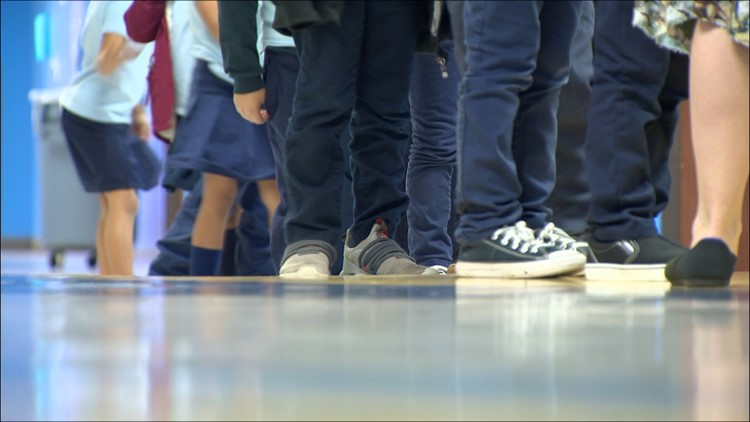WAXAHACHIE, Texas — A federal civil rights lawsuit filed Thursday accuses a North Texas school district of applying disciplinary policies in a way that punishes Black and Latino students more often and more harshly than their white peers.
The first incident mentioned in the lawsuit involved a student, identified in the lawsuit as C.J., at Waxahachie High School who said she was repeatedly harassed by another student to leave her spot at a lunch table, the lawsuit alleges.
The feud continued in an incident in which the student poured a beverage over C.J.’s head and a physical fight ensued, according to court documents.
“Despite being targeted by a bullying offending student, and despite clearly engaging in self-defense during a bullying incident, C.J. was put in-school suspension (ISS) for five days pending a hearing on the matter,” the lawsuit reads. “Upon information and belief, [the other student] was either not disciplined or received lesser discipline than C.J.”
C.J., who is Black, was subsequently placed in a discretionary Disciplinary Alternative Education Program (DAEP) for 30 days, the lawsuit alleges. It left her with a disciplinary record and unable to try out for the cheerleading team, the lawsuit alleges.
The second incident involved a student, identified in the lawsuit as S.W., at Howard Junior High School in Waxahachie ISD when she says other students cyberbullied her last fall, according to the lawsuit.
The lawsuit, filed by the parents of the students Thursday in the U.S. District Court for the Northern District of Texas, names Waxahachie ISD school board trustees and staff.
“The way the policies are written is facially neutral, but the way that they’re applied have a disparate impact along racial lines,” Attorney Mike Laux of the Laux Law Group, which represents the families of the two students, said in a recent press conference. “What it boils down to is a discriminatory discretion in the application of discipline policies.”
S.W. reported the incident and a stay-away directive was imposed on some of the students involved, court documents show.
About a month later, S.W.’s parents were advised S.W. had violated the stay-away directive despite not being informed that she was subject to a stay-away directive, the lawsuit alleges.
S.W. was placed on in-school suspension for violating the directive, according to the lawsuit.
Shortly thereafter, a student who was subject to the stay-away directive taunted S.W. again and a physical altercation ensued, after which S.W. was placed in a discretionary Disciplinary Alternative Education Program (DAEP) for 30 days, the lawsuit alleges. As a result, S.W. was kicked off the school’s volleyball team, according to the lawsuit.
Laux said he believes the lawsuit is the first of its kind filed against Waxahachie ISD.
“I’m unaware of another lawsuit brought against the district that alleges racial discrimination in the application of the disciplinary process,” he said.
Waxahachie ISD denied the allegations of discriminatory treatment of students in a statement to WFAA.
“The district maintains Board policies that specifically prohibit discrimination, bullying, or harassment of its students and employees and adheres faithfully to these policies,” the statement read. “WISD strives to be a place where every student has choices, opportunities to belong, and staff members who care deeply about their growth and success. We do not tolerate violence between students, bullying, or any other behavior that makes our campuses unsafe.”
“Due to state and federal laws protecting student information, the district is unable to specifically address matters that pertain to individual students,” Waxahachie ISD added.
As of late last week, Waxahachie ISD had 21 days to file a response, either an answer or motion to dismiss, Laux said, and he would then respond. The case could go to trial within 12-14 months.
Other headlines:



